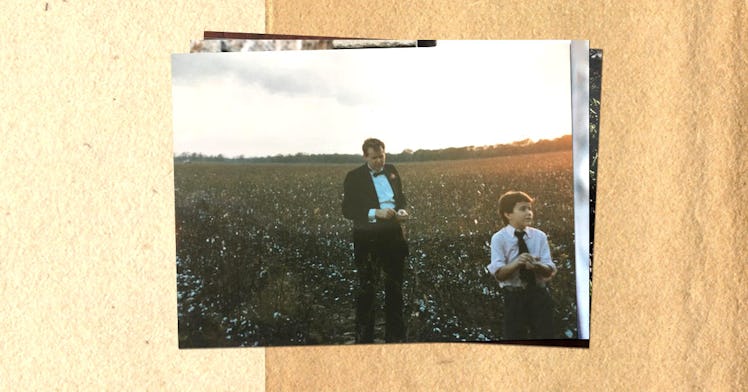My Father Never Met His Granddaughter, But She’ll Know His Stories
He was a southern gentleman, a gay activist, a college legend, and the kindest person I ever knew. I only wish he could have met his granddaughter.

My wife and I were a year into our marriage when I suddenly lost my father. We were talking about buying a starter house, talking about having kids, and finding reasons for postponing both. In the hours after my father died, we decided to have a child. A day later, we bought a house we’d never seen. Two weeks after that, my wife was pregnant. Loss rearranged my life overnight. And what I gained after was colored by grief.
The heightened awareness of mortality that you get after a death doesn’t last. For me the fearlessness that is a side effect of loss slipped away after a few months. I didn’t realize it was gone until I went back to things like stressing over errors on our cable bill. The magical contrails of loss had vanished. By then my life had already changed. A kid was coming and I was choosing what to assimilate from my father’s life into my own.
My dad was fearless in a way I will never be. Bill Bailey Carter was born the youngest son of an alcoholic cattle farmer and a postman’s daughter in rural Louisiana in 1951. He worked his father’s cattle farm with his brother from “can’t see, to can’t see,” which was my grandfather’s way of saying before sunrise to after sunset. But he was far too big for that little world. At eighteen, he drove to college in the Grabber Blue Pinto his brother gave him before he left for Vietnam, and never looked back.
He was a legend in college. He accidentally dosed himself with LSD while filling gel caps on a humid afternoon, and later streaked the basketball team’s movie night, scaring their dates. I went to a wedding a few years back in Louisiana, and a middle-aged man who had gone to his college was star struck at the mere mention of my father’s name, and told a story he’d been retelling for years, about my dad filling a canoe with ice and beer and turning it into a floating bar during a Phys Ed class in the Cane River.
After college, my father started an advertising agency out of the trunk of his MG Coupe and had me. He found success quickly and our home was happy. Then, when I was 10, he came out of the closet. A few years later, he ran away to Seattle with a Brazilian boyfriend and started a new life. He didn’t abandon me though. I lived with him in high school––my very own Birdcage draped in Emerald City flannel.
My father could be blunt. When I hesitated on next steps after college, he said, “The mama bird has to kick the baby bird out of the nest for it to learn how to live.” We drove to Los Angeles together and he left me there to start my adult life. A decade later, I went to visit him and his husband in Key West and met my wife. When we settled in Charleston, my dad packed up his house, his husband, and his Welsh Terrier and moved to South Carolina to be closer to grandkids we’d yet to conceive.
Less than a year after moving across the country, my dad went to the hospital with the flu and never left. When you lose your father, the only consolation is that you’re on the other side of the horrific inevitable. This is the only consolation of the inconsolable.
For many years I have thought of Shel Silverstein’s book, The Giving Tree, when I thought about my father. Like the tree and the boy, my father gave and gave and gave to me, and the comparison always came with a pang of guilt. Was I my own man or the sum of his giving? In the end, it wasn’t like the book at all. There was no stump for me to rest on, just the memory of a magnificent tree and the deep urge to plant another.
My daughter’s life will be different from mine. She will not come of age in a party pad surrounded by handsome men teaching her about eye cream and camembert. There will not be a gay porn section of her parents’ garage sales. And she will most certainly never accidentally put a drop of GHB into her eye from a repurposed Visine bottle that fell out of her father’s Burning Man kit. But when she’s older––much older––I will tell her stories about her grandfather. I will teach her to admire the biggest figure in her life she’ll never meet.
And his absence in my life will inform her life through me.
You learn something very specific when you go through the various stages of grief while raising a child. You look at your child for the first time every morning for the both of you. You hug them goodnight for the both of you. You try to impart the good without the bad, of the both of you. And every time I get frustrated by an extra half hour alone with her that pulls me away from my work, or another three-day weekend honored by no one but her school, I remember that he would have traded anything for the inconvenience. Grief reminds me how lucky I am. In death as in life, my father keeps me honest.
I’ll never forget the day I said goodbye to him, without reply, and let go of his hand. My father’s death is now a part of every day. In teaching me about the end, my father taught me to honor the beginning––and all the little things I might have taken for granted.